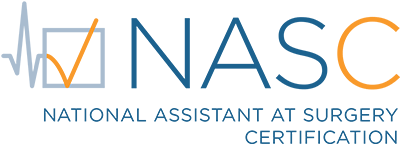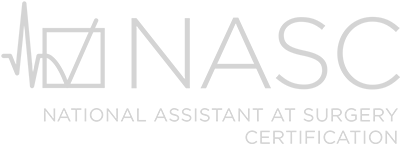How do I become a Registered Nurse First Assistant (RNFA)?
What is a Registered Nurse First Assistant (RNFA)?
A registered nurse first assistant (RNFA) is a perioperative registered nurse (RN) who functions as the first assistant to the surgeon during surgery (the intraoperative phase). Duties during the intraoperative phase include: using instruments and medical devices, providing surgical site exposure, handling and/or cutting tissue, providing hemostasis, suturing, and wound management. The RNFA role also includes practicing in the preoperative and postoperative areas and fostering patient advocacy and patient safety (AORN, 2014, AORN position Statement on Advanced Practice Registered Nurses in the Perioperative Environment).
What training is required for a Registered Nurse First Assistant (RNFA)?
A Registered Nurse (RN) or an Advanced Practice Nurse (APRN*) must complete an RNFA program that follows the AORN standards for RN First Assistant education programs. You can find the Education Standards and other useful RNFA information on the AORN website.
Who can apply for RNFA training?
Admissions requirements vary by the program that you choose to attend. To see a list of acceptable RNFA programs, click here. Please contact each program for specific admissions requirements. In general, the following is required to begin RNFA training:
- An APRN* can enter RNFA training with no perioperative experience.
- An RN must be CNOR-eligible to enroll in an RNFA program, and must earn CNOR before graduation. You can find more information on CNOR on the CCI website. CNOR requires at least two years of experience in perioperative nursing.
- As of January 1, 2020 a bachelor’s degree is required for admission to an RNFA program.
How long is the RNFA program?
The scope of RNFA training varies by program. Please see our list of Acceptable RNFA programs, and contact each program for specific information.
In general, an RNFA program will include:
- A didactic component that is an equivalent to at least three semester credit hours of study, including student assignments, classroom instruction, and laboratory practicums.
- A clinical component that includes at least 120 clinical practice hours in the RNFA role, as well as additional hours of preoperative and postoperative patient care management, working with a board-certified surgeon.
For details: See the AORN’s Educational Standards for RNFA Programs.
*An APRN (Advanced Practice Registered Nurse) is an RN who has earned a graduate-level degree such as a Master’s of Science in Nursing (MSN) or a Doctor of Nursing Practice (DNP). APRNs include Nurse Practitioners (NP), Clinical Nurse Specialists (CNS), Nurse Anesthetists (CRNA), and Certified Nurse Midwives (CNM).
19 Comments
-
-
Julia Johnson says:
Hi Ena,
You can find information on how to apply in our Blog post: https://nascertification.com/news/i-am-an-rnfa-how-do-i-get-certified/
-
-
[…] To become an RNFA, the nurse must have amassed significant experience and training as a perioperative nurse. After first learning the fundamentals of surgical nursing, advanced training is focused on the fundamentals of surgical techniques, procedures, and anatomy. A CNOR certification and, as of 2020, a BSN are required along with an unencumbered nursing license and a minimum of 2000 hours of experience as an RFNA. […]
-
Erica Hayes says:
What type of schooling if I am already a CSFA and will graduate with my bsn in nursing soon to become a RNFA?
-
Julia Johnson says:
Hi Erica,
Good question! Our eligibility requirements include graduation from an acceptable RNFA program. So, even though you are already a CSFA, you need to attend a first assistant program that was developed on a nursing model. There is a list of RNFA programs on our website: List of acceptable RNFA programs.
-
-
Dee says:
Hello,
Regarding the Baccalaureate requirement, does this degree have to be a BSN? I’m an RN with my ADN, but also have a BA in Social Work and a Master’s in Teaching.Thank you.
-
Julia Johnson says:
The degree does not have to be a BSN. Any Baccalaureate (Bachelor’s) degree is acceptable.
-
-
Jay says:
Hi. Can I work as RNFA as soon as I graduate from the program? or need to be a Certified RNFA?
My understanding is to become a certified RNFA need 2000 hours of RNFA experience, so before becoming a CRNFA do i have to work for surgeons for free to obtain those hours?-
Julia Johnson says:
Hi Jay. That decision is usually made at the facility level. Some facilities allow you to work after your RNFA program without being certified, and some require CRNFA. If your facility requires CRNFA, they may allow you to work as an RNFA while you get your 2,000 hours and complete the certification process.
-
-
Amin San says:
Hi,
I have a MSN and have completed both the didactic and 120 clinical practice hours in the RNFA role. How long will it take for me to get my certification? -
Sultan Asl says:
I have a job offer at a private practice but their associated hospital wants me to have RNFA certification. After submitting all my paperwork for RNFA how long will it take to review and obtain my certification? Appreciate a response as their offer is on hold till I can get them an answer.
-
Trystin Reid says:
Hi!
Do I need an RNFA certification from California in order to use it in California? Or can I get my RNFA certificate from Florida and use it in California?
Kindly,
Trystin
-
Julia Johnson says:
Hi Trystin. If you attend one of the RNFA programs on our list of acceptable programs, your certificate is accepted nationally.
-
-
Will Whiting says:
I just graduated from an RNFA program in Florida and will work in Florida, as well. Now that I’ve graduated, so I need to register as an RNFA or can I function in the RNFA role once my facility fully credentials me?
-
[…] Becoming a successful RNFA […]
-
Amy says:
Is the credential for an NP who completed a first assist program APRN FA or is it RNFA? Or something else?
-
Julia Johnson says:
Hi Amy, The credential is for any RN or APRN who has completed a program on the List of Acceptable Programs referenced in the article above.
-
Leave a Reply Cancel reply
info@nascertification.org | 866-681-NASC (6272) | Contact
© Copyright 2020 NASC


How do I apy for the RNFA certification?